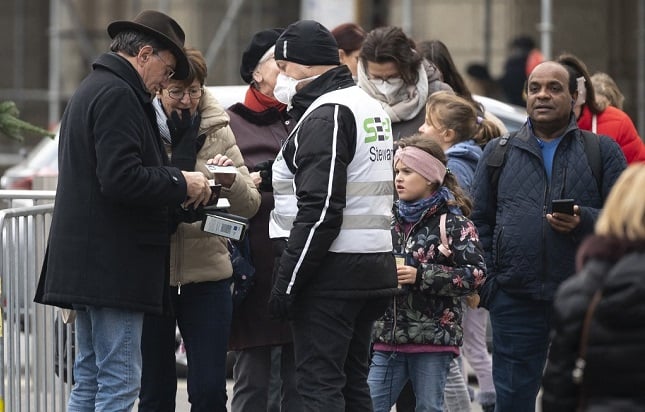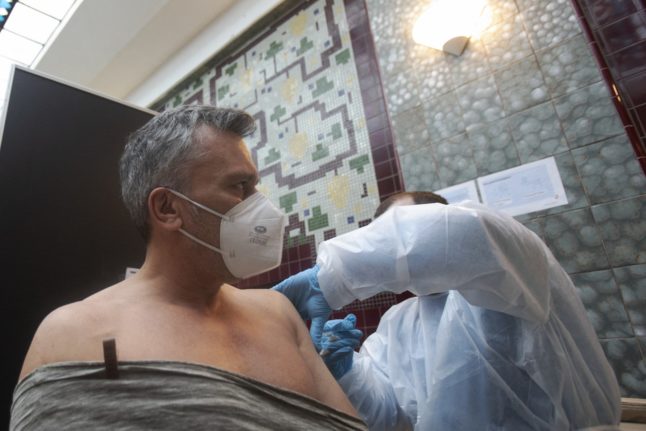A week after introducing rules that excluded people without 2G (proof of vaccination or recovery from Covid-19) from restaurants, cinemas, hairdressers and other businesses, on Monday Austria went a step a further and brought in a ten-day lockdown.
Under the new rules, people without a vaccine pass can only leave their house for certain special reasons such as work or food shopping, and can be subject to random checks by police and fines of up to €1,450.
KEY POINTS: The Covid rules that apply nationwide and regionally in Austria
Queues for vaccines
Austria’s Chancellor has said the lockdown is already having the desired effect, with people queuing for vaccines at centres across the country after the announcement of the measure.
“I have to get vaccinated now, otherwise nothing works any more,” a 31-year-old masseuse from Upper Austria told the Bayerischer Rundfunk.
‘Harsh but necessary’
An opinion poll carried out by research institute Unique for Profil magazine in early November, before the lockdown was announced amid a drastic rise in cases, found that 31 percent wanted a lockdown for the unvaccinated, while 14 percent wanted a general lockdown.
On Tuesday, Statista published the results of an opinion survey of 500 people carried out in October, which showed that 58 percent of people thought a lockdown only for unvaccinated people was either “absolutely the right thing to do” (38 percent) or “somewhat the right thing to do” (20 percent).
One student in Vienna told the Kronen Zeitung the measures are “harsh but necessary”.
And one passerby told France Info radio: “Unfortunately it’s necessary, there’s no other solution. We have been battling this virus for over a year and half.”
‘Discrimination’
The leader of the far-right Freedom Party (FPÖ) Herbert Kickl, who himself is in quarantine after testing positive for Covid-19, has also called the lockdown “discriminatory” and labelled it “the latest Corona madness”.
His party put forward a motion in Tuesday’s parliamentary session calling for the lockdown to be lifted and is calling for protests on Saturday.
Demonstrations on a smaller scale already took place last weekend following the announcement of the lockdown, with protestors chanting slogans such as “Freedom!” and “My body, my choice”.
Nikolaus Unterguggenberger, a 57-year-old teacher from Carinthia province, whose family is not vaccinated, said that the partial lockdown created a “two-class system”.
“Our freedoms are being taken away from us,” he told AFP, adding that the measure was illegal and that he would continue to go out and meet friends.
“It’s time that more people spoke up,” Sabine, a 49-year-old energy consultant, told AFP at a Vienna rally, calling the move “discrimination”.
Some of those unvaccinated said the restrictions would have little impact on their quality of life.
“I will continue to live as I always have done. I am not someone who goes to the restaurant every weekend. I prefer to get take-aways,” said Manuel.
‘Unenforceable’
Even people who are in favour of vaccination and accept that this is the best way out of the pandemic have raised concerns that the lockdown is polarising, and unlikely to be enforceable.
A passer-by in Lower Austria, named as Björn, told Der Standard in a video that the measure served to “demonise” unvaccinated people and noted “we vaccinated people are not completely risk-free”.
Another passer-by, Patrick, said: “My colleagues can come to work with a PCR test but by the new regulations, they can’t go across the hallway and go into another shop. Who is going to control that? The police can’t be everywhere and they can’t expect the workers in the shops to regulate it, so I don’t think it’s going to work.”
“Rather than pointing fingers and assigning blame, [efforts to curb the spread of the virus] should be about making the effort that there is no need for a lockdown – for anyone,” writes journalist Oona Kroisletner in a short column for Der Standard. According to her, the lockdown risks sending vaccine hesitant Austrians “not into the vaccination centres, but into the arms of the corona-sceptic parties and groups”.
“It is a pandemic of unvaccinated AND vaccinated people,” echoed a headline in the Kleine Zeitung, referring to ex-Chancellor Sebastian Kurz’s description of a “pandemic of the unvaccinated”.
- Can I use a foreign Covid vaccine certificate in Austrian hotels and restaurants?
- Austria’s Green Pass: What counts as proof of 2G?
‘Too late’
Some are sceptical that putting only unvaccinated people under lockdown will be enough to ease the severe pressure on Austria’s hospitals.
Walter Hasibeder, President of the Society for Anesthesiology, Resuscitation and Intensive Care Medicine (ÖGARI) has said the partial lockdown has come “too late”, instead calling for a general lockdown, at least in the regions of Salzburg and Upper Austria which have the highest incidence rates.



 Please whitelist us to continue reading.
Please whitelist us to continue reading.
The joys of living in a Catholic country.